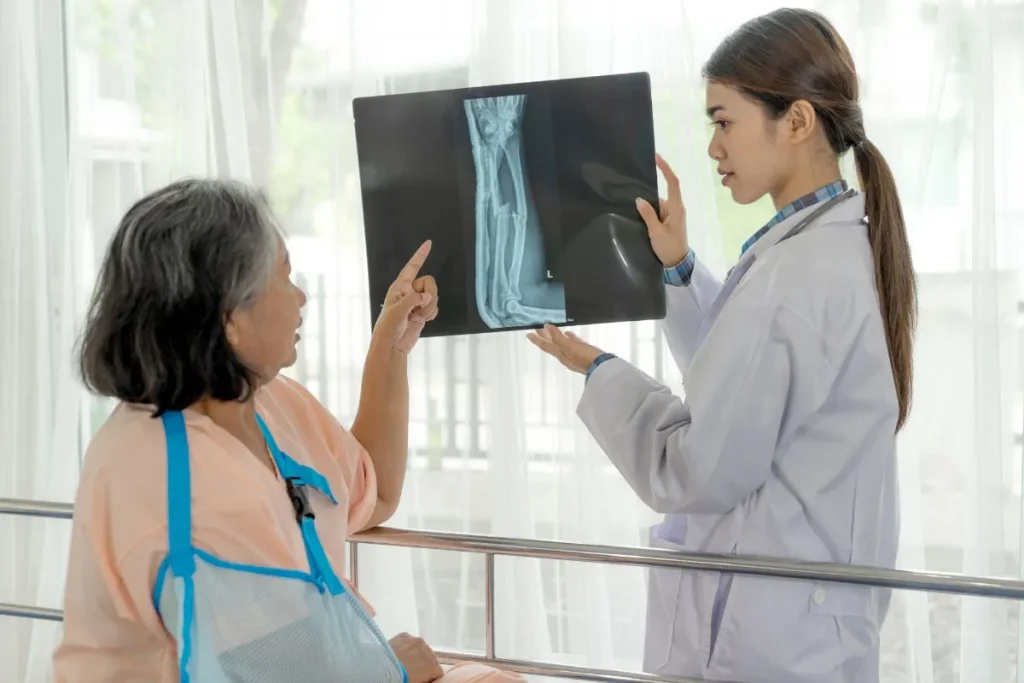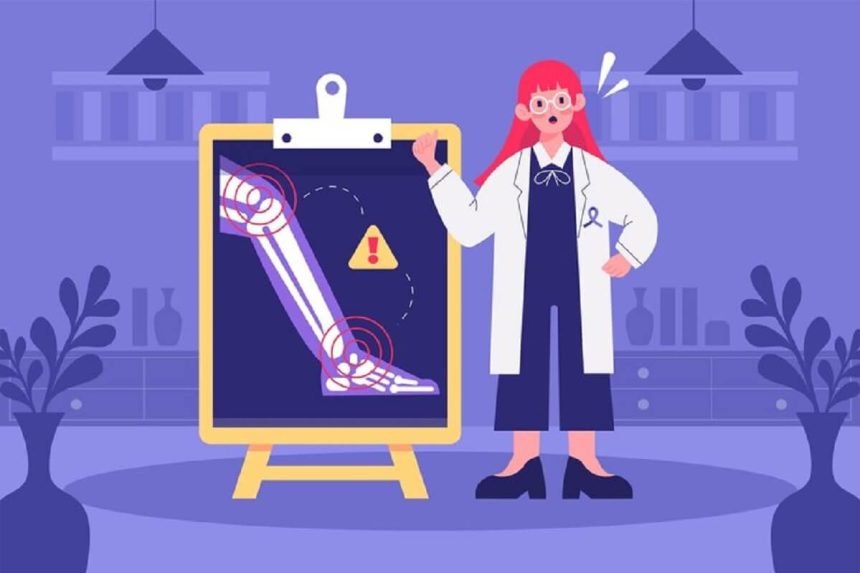Building Bone Strength: Effective Strategies for Post-Menopausal Osteoporosis Prevention
Menopause to Maturity: Key Dietary Steps to Prevent Osteoporosis
Is menopause signaling an increased risk of osteoporosis for you? Post-menopause, women face a significant rise in osteoporosis risk due to hormonal changes. Dr. Surpreet Kaur Sandhu, a leading gynecologist in Sarita Vihar, New Delhi, emphasizes the importance of proactive measures for osteoporosis prevention. This comprehensive guide will explore effective strategies, from dietary changes to lifestyle adjustments, that can strengthen your bones and reduce the risk of osteoporosis. Let’s embark on this journey to ensure your bones remain as strong and healthy as you are, even after menopause.

Embracing post-menopausal life means taking proactive steps towards bone health, ensuring a future as strong and vibrant as you are.
Dr. Surpreet Kaur Sandhu
Understanding Osteoporosis Post-Menopause
The connection between menopause and increased osteoporosis risk.
- Hormonal changes and bone density
- Identifying risk factors
- The importance of early prevention
Calcium and Vitamin D: The Bone Health Duo
Essential nutrients for maintaining and building bone strength.
- Sources of calcium and vitamin D
- Recommended daily intake
- Balancing diet and supplements
Regular Exercise for Bone Density
Physical activity’s role in strengthening bones.
- Weight-bearing and resistance exercises
- Tailoring exercise routines for age and ability
- Consistency and safety in exercise
Healthy Lifestyle Choices
Lifestyle modifications to support bone health.
- Avoiding smoking and limiting alcohol
- Maintaining a healthy weight
- Stress management techniques
Screening and Monitoring Bone Health
The importance of regular check-ups for early detection.
- Bone density scans and assessments
- Regular consultations with healthcare providers
- Understanding and interpreting results
Hormone Therapy and Medications
Evaluating the role of medical interventions in osteoporosis prevention.
- Pros and cons of hormone therapy
- Medications for bone density improvement
- Collaborating with healthcare professionals for personalized treatment
Nutrition Beyond Calcium
A holistic dietary approach to bone health
- Importance of magnesium, potassium, and protein
- Foods that can hinder bone health
- Creating a balanced and nutritious diet plan
Conclusion
According to Dr. Surpreet Kaur Sandhu, preventing osteoporosis after menopause necessitates a multifaceted approach that includes dietary modifications, regular exercise, and lifestyle changes. It’s never too late to start taking care of your bone health. By incorporating these strategies into your daily life, you can significantly reduce the risk of osteoporosis and lead a strong, healthy life post-menopause. Remember, regular medical check-ups and discussions with your healthcare provider are key to a personalized and effective osteoporosis prevention plan.
“East Delhi’s pride, the best obs gynae doctor, crafting a legacy of care, ensuring your journey to motherhood or wellness is adorned with expertise and compassion.”
Dr. Surpreet Kaur Sandhu
FAQs
Q: What are the first signs of osteoporosis after menopause?
Early signs can include reduced grip strength, receding gums, weakened or brittle nails, and a history of fractures or height loss.
Q: Can dietary changes alone prevent osteoporosis after menopause?
While dietary changes are crucial, Dr. Sandhu emphasizes that a combination of diet, exercise, and lifestyle choices is necessary for effective osteoporosis prevention.
Q: How often should I exercise to prevent osteoporosis?
Dr. Sandhu recommends regular exercise, ideally weight-bearing and resistance training, for at least 30 minutes, three to four times a week.
Q: Are there any specific foods I should avoid to prevent osteoporosis?
Foods high in salt, caffeine, and certain animal proteins may need to be limited, as they can contribute to calcium loss from bones.
Q: What type of calcium supplements are best for post-menopausal women?
Dr. Sandhu suggests calcium citrate or calcium carbonate supplements, depending on individual tolerance and dietary intake, after consulting with a healthcare provider.
Q: Is hormone replacement therapy (HRT) a good option for osteoporosis prevention?
HRT can be beneficial for some women, but it’s important to discuss the risks and benefits with a healthcare provider, as individual health factors play a significant role.
Q: Can lifestyle changes reverse osteoporosis?
While lifestyle changes may not completely reverse osteoporosis, they can significantly slow its progression and reduce the risk of fractures.
Q: How does vitamin D intake affect bone health post-menopause?
Vitamin D is essential for calcium absorption; inadequate vitamin D can lead to weaker bones and increased osteoporosis risk, particularly post-menopause.
Q: What are the first signs of osteoporosis that post-menopausal women should be aware of?
Post-menopausal women should watch for signs like a decrease in height, back pain, or fractures from minor falls. Dr. Surpreet Kaur Sandhu advises regular bone density tests as early detection is crucial.
Q: Can dietary changes alone effectively prevent osteoporosis after menopause?
Dietary changes are important but not solely sufficient. Dr. Sandhu emphasizes a combination of a balanced diet rich in calcium and vitamin D, regular weight-bearing exercises, and lifestyle modifications for effective prevention.
Q: How often should post-menopausal women exercise to prevent osteoporosis?
Dr. Surpreet Kaur Sandhu recommends that post-menopausal women engage in weight-bearing and muscle-strengthening exercises for at least 30 minutes, three to four times a week, to maintain bone density and strength.
Q: Are there specific foods that post-menopausal women should avoid to reduce osteoporosis risk?
Dr. Sandhu advises post-menopausal women to limit intake of high-sodium foods, excessive caffeine, and alcohol as they can interfere with calcium absorption and bone health.
Q: What type of calcium supplements are most effective for osteoporosis prevention in post-menopausal women?
Dr. Sandhu suggests calcium citrate or calcium carbonate supplements, depending on individual health conditions and dietary intake. It’s important to consult with a healthcare provider for personalized advice.
Q: Is hormone replacement therapy (HRT) recommended for osteoporosis prevention in post-menopausal women?
HRT can be beneficial for osteoporosis prevention in some post-menopausal women, but it’s essential to discuss the potential risks and benefits with a healthcare provider, as Dr. Sandhu advises, considering individual health profiles.
Q: Can lifestyle changes have a significant impact on reversing osteoporosis post-menopause?
While osteoporosis cannot be completely reversed, lifestyle changes like a healthy diet, regular exercise, and avoiding smoking can significantly slow its progression and reduce fracture risk, as per Dr. Sandhu’s guidance.
Q: How does vitamin D intake affect bone health in post-menopausal women?
Vitamin D plays a crucial role in calcium absorption and bone health. Dr. Sandhu highlights the importance of adequate vitamin D intake, through diet or supplements, to prevent osteoporosis in post-menopausal women.



